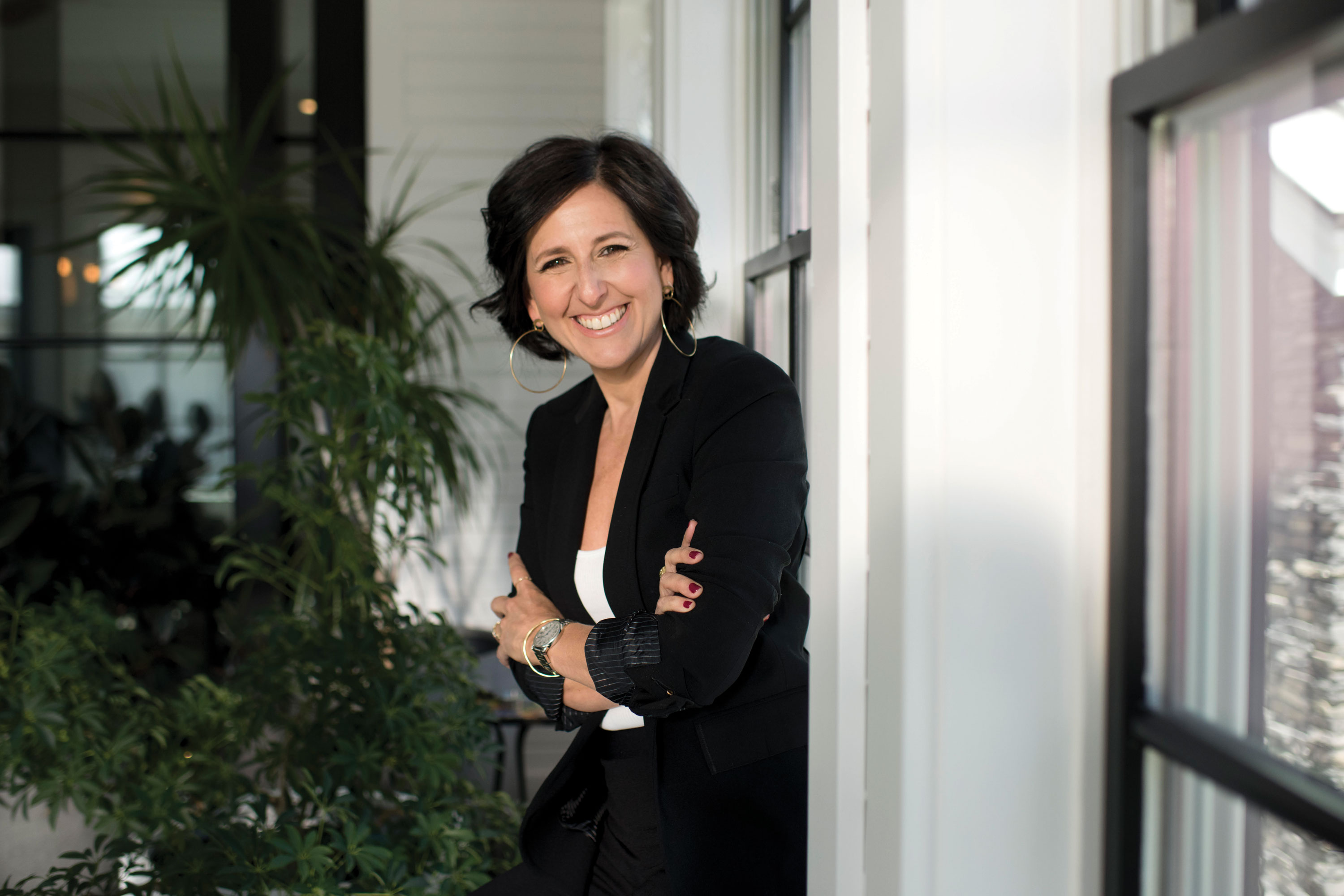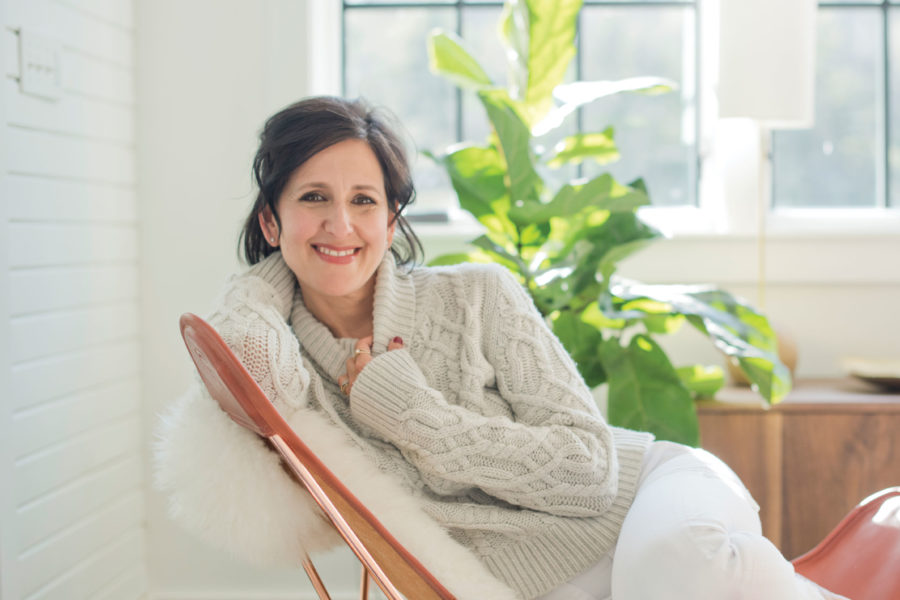Physician, midwife, herbalist, author Aviva Romm has been advocating for women’s and children’s health for more than 30 years. Maybe you’ve seen her on television, relaxed and impossibly young-looking for a grandmother — she’s 53 — chatting with Dr. Oz and discussing the link between diet and a healthy thyroid. Perhaps you’ve read an interview with her explaining, as she did to STAT News, “I’m not one of these integrative doctors who thinks just because something is alternative, it’s safe and good. I try to keep my doctor thinking cap on as well.”
She’s been an early adopter of ideas that have seemed countercultural, only to later become mainstream. “I was one of the early clarion bell ringers advocating for being more cautious and judicious about antibiotic overuse. For my own kids, I would have used antibiotics, if they’d needed it,” she says. “But I was thoughtful about keeping them healthy, and when they did have colds, not jumping to antibiotics.”
She was also an early advocate for microbiome research, examining how the genetics of microorganisms in the human gut interact with diet to affect our health. “The idea that gut health is central to our total health goes back thousands of years,” she says. Nevertheless, not so long ago “microbiome research was considered wacky. Now millions of dollars are being dedicated to it.”
Trained at Yale School of Medicine, board-certified in family medicine with obstetrics, Romm is not one of those alternative health gurus who pass out formulas for the perfect, sure-fire diet or exercise routine or medical regimen. She’s also wary of what she sees as some doctors’ knee-jerk response to prescribe drugs or surgery and medical devices. Instead, she practices what she calls “functional and integrative medicine,” looking for “the best available treatments — conventional or alternative — that are most effective or least harmful for patients within a wide spectrum. Whether it’s prayers or nuclear medicine, what’s safe and most effective.”
It’s an approach that strives to bridge traditional wisdom and modern medicine, taking the best from each. Most of all, it’s not a one-size-fits-all approach to wellness. “It looks at the whole person, not just the body. It recognizes that our diet, culture, zip codes and so on are all determinants of our health.”
Romm gives an example. “Let’s say someone comes in with a blood-sugar level that suggests prediabetes. It’s not enough to say, here’s the safest, most effective diet or drug, though that may be an important part of it. Look at the person. Suppose it’s a 60-year-old woman working two jobs, including a night shift, and her cortisol levels are high. Just changing her diet won’t be enough. There needs to be a whole-person perspective.”
With Romm’s combination of expertise as a traditionally trained physician, midwife and herbalist, her dream is less about changing medicine than it is about changing the way women interact with it. “I want to boost women’s confidence about their bodies and their health so they’re not distracted by worries and misinformation that keep them from living their best lives.”
To that end, she writes and speaks, offers advice and training, and sees patients, drawing on years of experience, navigating between counterculture and mainstream health practices.
The Road Less Traveled
We caught up with Romm by phone from her home, now an empty nest with her four children grown. Talking to her feels like settling in for a chat with a smart, friendly neighbor. She has an easy laugh and a disarming candor, and she’s brimming with down-to-earth common sense.
Though she lives on a quiet country road in the Berkshires, hers is not the quiet life. From home, she writes — she’s the author of seven books, her most recent “The Adrenal Thyroid Revolution” — and sees patients (most via telemedicine). With her husband, she runs an active social network and small media empire that includes podcasting, blogging, online courses and television appearances. She still practices midwifery, and she midwifed the home delivery of two of her grandchildren. They were born to her daughter-in-law, a Harvard-trained pediatrician.
Romm has come a long way from the Queens housing project where she grew up in a cramped apartment with her brother and their single mom, whom she remembers as “pretty, competent, confident and courageous.”
Though Romm always wanted to be a doctor, she wasn’t one of those kids who played with a toy doctor’s kit, ministering to her dolls and vaccinating reluctant family members. She was more of a science geek. “What I really loved to do was take things apart. I had a toy clock, and I remember getting a flathead screwdriver and hammer from my mom, and cracking it open along the seams to see how it worked.” She also loved to collect and catalogue rocks which, like that toy clock, she’d crack open to see what was inside.
Presaging her decade-long tenure as president of the American Herbalists Guild, as a child Romm also collected flowers. The pages of her grandfather’s Encyclopedia Britannica were stained with the specimens she gathered near his home on Long Island and pressed between their pages.
She also started to write. “Other girls were collecting dolls, I was collecting pens and notebooks. I kept a journal and made illustrations.” She was also a budding entrepreneur. “My first business in third grade was selling macramé plant hangers and bead work.”
Her lofty vision of her future self included “living in a brownstone on Washington Square Park, winning a Nobel Prize, and being a neurosurgeon.”

WENDY YALOM
Aviva Romm
Curious, articulate, smart and ambitious, it’s no surprise that she excelled in school and was accepted at Bronx High School of Science, New York City’s premier high school for gifted and talented. But the daily, hour-long commute to school was exhausting, and she felt unsafe returning to her home neighborhood which, in the 1980s, was swept by the scourge of crack. At 15, she was miserable at home and miserable at school. In a single year she gained 35 pounds.
One thing she knew for sure: She wanted to be a doctor. So she did what only a bright, desperately unhappy young girl with and big dreams and a massive amount of chutzpah might do. She wrote to Johns Hopkins Medical School. She remembers telling them, “I’m really smart, and I really want to be doctor. Can I skip high school and start medical school now?”
That letter must have made an impression because an amazing thing happened. Someone in the Johns Hopkins admissions office wrote her back a personal letter. She was too young for medical school, the letter said, but suggested that she consider applying to a new program in Western Massachusetts for gifted and talented kids who wanted to skip high school.
Romm remembers getting that letter as a major turning point in her life. It “threw me a life preserver in rough water. If there are guardian spirits, that was one of mine.”
She applied to Simon’s Rock at Bard College. She was accepted and awarded a scholarship. In her first year there she met Tracy Romm, the man who would become her husband. She remembers him as “a hippie alternative law school dropout” from Atlanta with a “Southern ease about him.” He would go on to become a high school teacher, principal and eventually Romm’s co-author and Chief Operating Officer of Aviva Romm Enterprises. Back then, he introduced her to the first midwife she’d ever met.
The summer after her first year at Simon’s Rock, Romm moved to Cambridge and studied with a midwife. She became a vegetarian and started learning about herbal medicine and dietary consciousness. In those days, she says with a laugh, “It was all fringe. My beliefs were so countercultural, my family thought I’d joined a cult.”
She returned to Simon’s Rock in September, but had to drop out for lack of funds. Instead of returning home, discouraged and with her tail between her legs, the incredibly resilient teenager began apprenticing to become a midwife, studying herbal medicine in earnest, and writing. At 19, she and her husband had their first child. She would go on to have three more children, home-schooling them all.
Looking back, she says, “A whole other pathway opened up to me. I took the road less traveled. I made a way.”
Caring for Women
As a midwife, Romm saw firsthand how women’s health concerns were routinely brushed off. “My first exposure was to women in the black community who were having difficulty with getting proper medical care. One woman went to an emergency room late in pregnancy with severe abdominal pain. She was turned away and ended up with a uterine rupture. That can be life threatening. She lost the baby,” she says, her voice welling up with emotion. “That’s just how broken the system is for people who are socially disenfranchised.”
For more than 20 years she practiced as a midwife and herbalist, finally taking the course work she needed to apply to medical school. Throughout that time, she continued to see “so many incidents of women being mistreated, so many shocking stories.”
Even after she enrolled at Yale School of Medicine at age 39, finally fulfilling her dream of attending medical school, “I saw systemic failure that sometimes led to severe adverse outcomes, including death. All as a result of people not listening to patients, not following up carefully enough on test results. All because hospitals pay incentives to turn over that bed by 10 in the morning. [It’s] a system that values profits over people.”
The drive for profits, she says, is compounded by “rampant gender bias.” For example, studies show that women in chronic pain are routinely ignored and mistreated. “Women who come in nicely dressed or too attractive get dismissed as not in pain. If a woman comes in looking sloppy, she’s judged as drug-seeking.”
When it comes to advocating for themselves with doctors, she points out, women are particularly vulnerable “to power dynamics, even the most ardent millennials. You’re already anxious and vulnerable and put into some kind of clothing item that’s flapping open while the practitioner is fully dressed. You’re seated not at the same height. You’re calling them Doctor, and they’re calling you by your first name.”
That unequal power dynamic is endemic in our culture because, she says, “As women, we’re tacitly taught not to be aggressive. Be nice. Don’t make waves. Trust the doctor.” Meanwhile the doctor is under pressure to see so many patients a day. “As a consequence, often diagnoses are missed.”
The results can be catastrophic. For example, says Romm, “On average it takes five years and four doctors for women to get an autoimmune diagnosis, and nine years to get an endometriosis diagnosis.” These patients are often prescribed anti-anxiety medications instead of an effective treatment.
“It’s really hard to be struggling with your health. Spending hours to find insurance providers. Finding alternatives that don’t cost an arm and leg.” What keeps her going, she says, “are the emails and correspondence I get from women, truly every single day, who are going through health concerns or challenges in their lives, or something with their child or partner.” She helps them “find information that they can rely on that doesn’t necessarily involve jumping immediately to pharmaceuticals or surgery.”
Romm has chosen the road less traveled and reaped its rewards. Turns out she doesn’t need a brownstone on Washington Square Park, a Nobel Prize, or a degree in neurosurgery. She’s living her dream of helping women listen to their own bodies and effectively advocate for their own health. “It’s more than enough,” she says, “that women can reach out and find me, and I’m fortunate enough to have the resources to respond.”
Your Health, Your Call
Romm offers advice for shifting the power dynamic with your physician.
- Go in with a script: Prioritize, write down questions in advance.
- Bring an advocate, a witness who will fight for you (probably not a relative or a male).
- Take notes or bring a tape recorder.
- If your symptoms are dismissed or minimized, get a second opinion and keep going until you get answers.
- Be informed, but do your online research at reliable sources like Healthline or the Mayo Clinic.
- Raise questions if the suggested treatment sounds extreme, too good to be true, or antithetical to what you want.
- If a surgical procedure or medical device is recommended, ask: “How many times have you done this procedure? What is your outcome rate for complications immediately after and a year later? Are you paid by anyone associated with this device or treatment?”
Life, Death and Diet
If Romm had her way, she’d change how the health care industry reacts to three major issues.



 12 min read
12 min read


